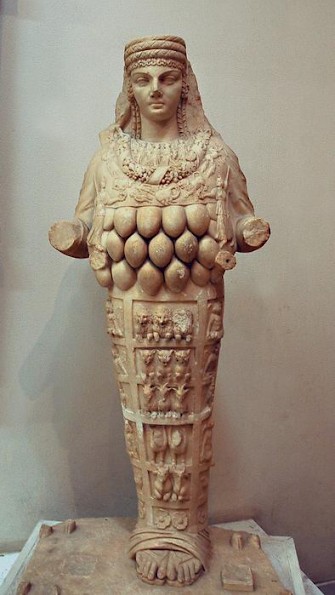Artemis of Ephesus
The Ephesian Artemis, the "great mother goddess" also mentioned in the New Testament (Acts 19), was extremely popular in the ancient world, as we might deduce from the fact that copies of her cult statue have been excavated in many parts of the Roman Empire.

The goddess was originally, before her cult was taken over by the Greeks, called "Artimus", and her temple - one of the Seven Wonders of the Ancient World - received gifts from the Lydian king Croesus (c.560-c.547). She is related to other Anatolian mother goddesses, like Cybele. The Ephesians believed that Artemis was born in Ephesus (and not on Delos, as was commonly assumed), and accepted the shrine as an asylum.note. Later, the Persians patronized the cult; the high priest was called the "Megabyxus", a Persian name that means "the one set free for the cult of the divinity". The original cult statue was made of wood, but was probably lost after the great fire of 356 B
TRADE GUILDS. Associations of men in the same craft or trade who have organized for mutual protection and for social and religious benefits.
In ancient times, guilds were more like fraternal orders than like labor unions. They seldom concerned themselves with wages, hours, or conditions of labor. Many of them were mutual benefit societies to defray the cost of a funeral. Their chief aim was pleasure and social intercourse. They were found all over the ancient world—in Egypt, Assyria, Babylonia, Greece, Rome, Syria, Persia, Palestine. In Rome, as early as the 7th century b.c., there were guilds of flute players, goldsmiths, coppersmiths, fullers, shoemakers, dyers, and carpenters. By the 2nd century b.c., cooks, tanners, builders, bronze workers, ironworkers, coppersmiths, weavers, priests, all had their own guilds and membership in a guild was compulsory. No one was permitted to leave the guild in which he was enrolled, and a son was required to follow the trade of his father. In Assyria, people were divided into five classes, with the patricians or nobles at the top, and craftsmen and professions organized into guilds directly below them. In Persia, there was a well-organized guild of physicians and surgeons, whose fees were fixed by law
----------------------------------
Isaiah 44:9-20
Holman Christian Standard Bible
9 All who make idols are nothing,
and what they treasure does not profit.
Their witnesses do not see or know anything,
so they will be put to shame.
10 Who makes a god or casts a metal image
for no profit?
11 Look, all its worshipers will be put to shame,
and the craftsmen are humans.
They all will assemble and stand;
they all will be startled and put to shame.
12 The ironworker labors over the coals,
shapes the idol with hammers,
and works it with his strong arm.
Also he grows hungry and his strength fails;
he doesn’t drink water and is faint.
13 The woodworker stretches out a measuring line,
he outlines it with a stylus;
he shapes it with chisels
and outlines it with a compass.
He makes it according to a human likeness,
like a beautiful person,
to dwell in a temple.
14 He cuts down[a] cedars for his use,
or he takes a cypress or an oak.
He lets it grow strong among the trees of the forest.
He plants a laurel, and the rain makes it grow.
15 It serves as fuel for man.
He takes some of it and warms himself;
also he kindles a fire and bakes bread;
he even makes it into a god and worships it;
he makes an idol from it and bows down to it.
16 He burns half of it in a fire,
and he roasts meat on that half.
He eats the roast and is satisfied.
He warms himself and says, “Ah!
I am warm, I see the blaze.”
17 He makes a god or his idol with the rest of it.
He bows down to it and worships;
He prays to it, “Save me, for you are my god.”
18 Such people[b] do not comprehend
and cannot understand,
for He has shut their eyes[c] so they cannot see,
and their minds so they cannot understand.
19 No one reflects,
no one has the perception or insight to say,
“I burned half of it in the fire,
I also baked bread on its coals,
I roasted meat and ate.
I will make something detestable with the rest of it,
and I will bow down to a block of wood.”
20 He feeds on[d] ashes.
His deceived mind has led him astray,
and he cannot deliver himself,
or say, “Isn’t there a lie in my right hand?”

No comments:
Post a Comment